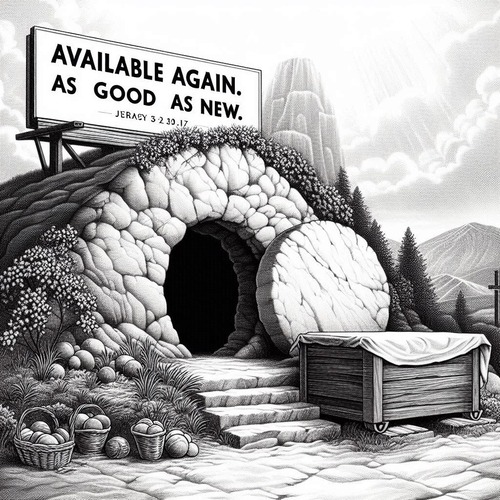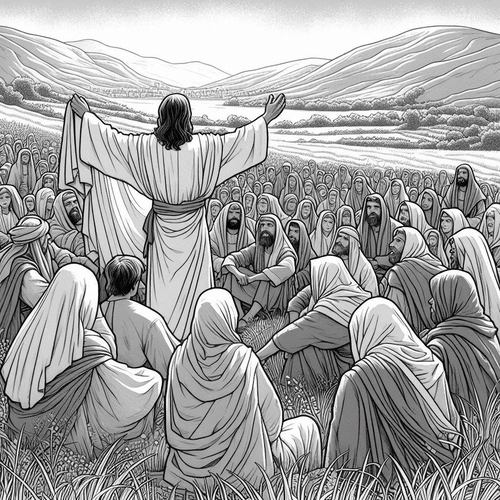Colossians 1:15: How is Jesus the Firstborn of All Creation?
The title “Firstborn of All Creation” is one of Scripture’s most emphatic descriptions of Christ’s pre-eminence, and yet, is often misunderstood. The designation, found in Colossians 1:15, carries deep theological significance: it speaks to Christ’s eternal nature, supreme authority, and relationship to both creation and the Father. Let’s explore this rich biblical concept and its implications for Christian faith and practice.
UNDERSTANDING “FIRSTBORN” IN BIBLICAL CONTEXT
To grasp how Christ is the “Firstborn,” we must first understand how the term functioned in biblical times. In the ancient Near East, “firstborn” (Greek: prōtotokos) carried significance far beyond birth order. It primarily conveyed rank, pre-eminence, and inheritance rights. This is evident in numerous Old Testament passages where God designates Israel as His “firstborn” (Exodus 4:22) or appoints David, though youngest among his brothers, as “firstborn” among kings (Psalm 89:27).
When Paul describes Christ as “Firstborn of all creation” in Colossians 1:15, he employs this cultural understanding to communicate Christ’s supreme rank and authority rather than suggesting He was the first created being. This interpretation becomes clear as we examine the surrounding context, where Paul immediately declares that “by Him all things were created” (Colossians 1:16).
THEOLOGICAL SIGNIFICANCE OF CHRIST AS FIRSTBORN
The doctrine of Christ as Firstborn affirms several crucial truths about His person and work:
- It speaks to Christ’s pre-existence. As John 1:1-3 declares, the Word was “in the beginning with God” and was the agent of all creation. Christ’s eternal existence means He precedes and transcends the created order, sharing a unique relationship with the Father through eternal generation.
- It establishes Christ’s sovereign authority over creation. Colossians 1:16-17 elaborates that “all things were created through Him and for Him,” and “in Him all things hold together.” This comprehensive lordship extends over both the visible and invisible realms, encompassing every aspect of created reality.
- It speaks to Christ’s mediatorial office as head over all creation. This understanding connects intimately with covenant theology, where Christ is the eternal Son appointed before creation to be the head of God’s redemptive purposes. His position as Firstborn guarantees both creation’s purpose and humanity’s salvation through His perfect mediation.
Implications for Christian Life and Doctrine
Understanding Christ as Firstborn carries profound implications for Christian faith and practice. First, it establishes the absolute supremacy of Christ in salvation. As Firstborn, He possesses both the right and power to redeem His people, ensuring their inheritance as adopted children of God.
This truth demands proper worship and devotion. If Christ holds pre-eminence over all creation, He deserves nothing less than our complete allegiance and adoration. This shapes both our corporate worship and personal devotion, leading us to acknowledge His lordship in every area of life.
Furthermore, the doctrine helps us understand our own position in Christ. As believers united to the Firstborn Son, we receive an inheritance and standing before God that flows from His preeminent position.
COMMON OBJECTIONS AND RESPONSES TO CHRIST AS FIRSTBORN
Throughout church history, there have been several objections regarding the proper interpretation of Christ as “Firstborn of all creation.” Here are the key challenges:
- The Arian Misinterpretation: The ancient heresy of Arianism claimed “firstborn” meant Jesus was the first created being, superior to other creatures but still created. This interpretation fails to account for the cultural meaning of “firstborn” as primarily about rank and authority rather than temporal sequence. It also directly contradicts Colossians 1:16 which states all things were created through Christ.
- The Creation Relationship Question: Some argue being “firstborn of creation” necessarily makes Christ part of creation itself. However, the genitive construction in Greek (prōtotokos pasēs ktiseōs) can express sovereignty over rather than membership within—just as David was made “firstborn” over the kings of the earth in Psalm 89:27 without being one of those kings.
- “Firstborn” vs. “Only Begotten”: Questions arise about how to harmonise Christ as both “firstborn” (prōtotokos) and “only begotten” (monogenēs). These titles serve different theological purposes—”only begotten” speaks to Christ’s unique relationship with the Father, while “firstborn” emphasises His pre-eminence and rights of inheritance over creation.
- The Timing Question: Critics sometimes ask how Christ can be “firstborn” before creation existed. The title speaks to Christ’s eternal position and authority rather than to any temporal sequence, reflecting an eternal reality rather than a moment in time.
- The Multiple “Firstborn” References: Scripture refers to Christ as “firstborn” in several contexts (of creation, from the dead, among many brothers). These various uses of “firstborn” work together to establish Christ’s pre-eminence in different spheres—over creation, in resurrection, and in the family of God.
PRACTICAL APPLICATIONS
This doctrine should shape our daily lives in several ways:
Our worship should reflect Christ’s supreme position, acknowledging His authority over every aspect of existence. Our prayers, songs, and corporate gatherings should celebrate His pre-eminence.
In discipleship, Christ’s firstborn status informs how we view and interact with creation. Everything exists through Him and for Him, giving purpose and direction to our stewardship of creation and our daily work.
For evangelism, this truth provides a powerful testimony to Christ’s unique authority and ability to save. We can confidently proclaim Him as Lord of all, knowing He rightfully claims authority over every person and nation.
CONCLUSION: JESUS THE FIRSTBORN OF ALL CREATION
Jesus’ position as Firstborn of All Creation is a magnificent declaration of His eternal nature, supreme authority, and sovereign rule over all things. This truth calls us to renewed worship, deeper faith, and complete submission to His lordship. As we grasp the full significance of this title, may we join creation in acknowledging Christ’s pre-eminence and living for His glory.
In all things, He must have the supremacy (Colossians 1:18). Our preeminent Lord invites us not only to understand His position but to find our place in His story, participating in His kingdom work until all things are fully subject to His rule.
This truth moves us beyond mere theological understanding to transformed lives that reflect the reality of Christ’s firstborn status—lives marked by worship, submission and joyful participation in His kingdom purposes.
JESUS THE FIRSTBORN OF ALL CREATION—RELATED FAQs
Does Jesus being “firstborn” mean Mary had other children? The title “firstborn” in Colossians 1:15 is completely separate from the question of Mary’s other children, as it refers to Christ’s divine pre-eminence rather than His human birth. While there is debate among Christians about whether Mary had other children after Jesus, this theological title relates to Christ’s eternal position and authority rather than His earthly family relationships.
- How does Christ’s position as firstborn relate to angels? Hebrews 1:6 specifically mentions that angels worship the “firstborn” when He enters the world, establishing Christ’s superiority over the angelic realm. This fits with Colossians 1:16’s statement that Christ created all things, including the invisible realm of angels, demonstrating His absolute authority over them.
- What’s the connection between Christ as ‘firstborn’ and the Old Testament practice of redeeming the firstborn? The Old Testament law required the firstborn son to be redeemed (Exodus 13:2, 13), pointing to their special consecration to God. This redemption practice foreshadowed Christ’s unique consecration and His role in redeeming others, creating a rich theological connection between the Old Testament shadow and its New Testament fulfillment in Christ.
Does Christ’s ‘firstborn’ status affect His role as mediator? Christ’s position as firstborn directly enhances His mediatorial role by establishing His authority over both creation and the new creation. His preeminent position means He has the right and authority to represent both God to humanity and humanity to God, making Him the perfect mediator of the new covenant.
- How does Christ being ‘firstborn’ relate to the concept of inheritance in the Bible? In biblical culture, the firstborn received a double portion of inheritance and special rights of succession. Christ’s designation as firstborn means He is the heir of all things (Hebrews 1:2), and believers become joint-heirs with Him through adoption, sharing in His inheritance.
- Is there a connection between Christ as ‘firstborn’ and the resurrection? Colossians 1:18 specifically calls Christ the “firstborn from the dead,” connecting His pre-eminence to His resurrection. This dual use of firstborn (over creation and from the dead) shows how Christ’s authority extends over both the original creation and the new creation inaugurated by His resurrection.
How does understanding Christ as ‘firstborn’ impact our view of creation care? Since Christ is firstborn over all creation, and all things were created through Him and for Him, this gives creation itself a dignity and purpose that should influence how Christians view environmental stewardship. Our care for creation becomes an act of honouring Christ’s lordship and treating His inheritance with appropriate respect.
JESUS THE FIRSTBORN OF ALL CREATION—OUR RELATED POSTS
Editor's Pick

GPS Without Eyes: How Ants Silently Shout Intelligent Design
Picture a leafcutter ant navigating the rainforest floor in pitch darkness, carrying a leaf fragment 50 times its body weight. [...]

Born Broken: Why Must We Affirm Original Sin?
Imagine a world where we’re born neutral—free to choose good, and without a bias toward evil. Sounds appealing… until we [...]

Does God Truly Care About My Everyday Choices?
OWe believe God created the universe. We believe He orchestrated the exodus from Egypt and raised Jesus from the dead. [...]
SUPPORT US:
Feel the Holy Spirit's gentle nudge to partner with us?
Donate Online:
Account Name: TRUTHS TO DIE FOR FOUNDATION
Account Number: 10243565459
Bank IFSC: IDFB0043391
Bank Name: IDFC FIRST BANK






